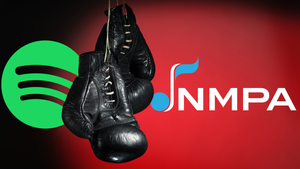The US National Music Publishers Association has announced that its members have started issuing takedown notices against Spotify over music used in podcasts without licence, stating that the streaming service has been aware of the problem of unlicensed music in podcasts for years, but “has taken no meaningful action” to address the issue.
For its part, Spotify says that the sudden flurry of takedown notices is a simple “press stunt” and, not only that, but a “weak reaction” by the publishers to a judge last week dismissing legal action over its sneaky audiobook bundling trick.
“Spotify has thousands of unlicensed songs in its podcasts, which it has done nothing to remedy”, says NMPA CEO David Israelite, adding “this takedown action comes as no surprise” because “we have warned of this issue for some time”.
The use of music in podcasts, he goes on, “is a growing source of revenue for songwriters and publishers”, and therefore “it is essential that podcasts provide lawfully produced entertainment”. Spotify knows how to make this happen, he says, but has so far chosen not to.
In response, Spotify states that it regularly receives takedown notices against user-generated content that is available on its platform, such as podcasts, and - regarding the publishers’ takedowns - “we will act promptly and, where appropriate, remove the episodes in question”.
However, a spokesperson added, it’s no coincidence that the NMPA’s announcement closely follows a judge dismissing the Spotify targeting lawsuit filed by collecting society MLC.
That litigation related to Spotify’s decision to reclassify its main subscription product as a music + audiobooks bundle, to benefit from a bundling discount in the compulsory licence that the MLC administers. Doing so meant it could pay less money to songwriters and music publishers in the US. Both NMPA and MLC argue that Spotify doesn’t qualify for that discount.
“This is a weak reaction to the judge dismissing the MLC’s lawsuit”, Spotify’s spokesperson adds. Noting that the NMPA first publicly raised the issue of unlicensed music in podcasts as the dispute over the bundling trick gained momentum last spring, the spokesperson concludes, “The fact that the NMPA waited months, despite multiple written requests by Spotify for details, which they never bothered to answer, to report these episodes only further emphasises that this is a press stunt”.
Bespoke podcast platforms generally don’t have licences from the music industry, which means individual podcasters need to sort out licences for any background music or theme music, or if they include commercially released tracks in their programmes.
Arguably this is one of the reasons why the podcast sector is dominated by spoken word shows, because many podcasters aren’t in a position to navigate the often complicated world of music licensing.
Inevitably, a certain number of podcasts are distributed that include unlicensed music. Platforms that host those podcasts would usually rely on the copyright safe harbour to avoid liability for the copyright infringement they are facilitating. To do that, they need to have a system in place whereby rightsholders can request that podcasts containing unlicensed music are removed.
Spotify, of course, has licences for the music side of its operation. In the US, when it comes to the song rights, it relies on the MLC administered compulsory licence that covers mechanical rights, while the separate performing rights are licensed by collecting societies like BMI and ASCAP.
However, the mechanical rights compulsory licence doesn’t cover any podcasts or videos on Spotify’s platform, hence the need for separate licences.
As the NMPA went to war with Spotify last spring over its employment of the bundling discount, it also issued an open letter stating, “It has come to our attention that Spotify reproduces and distributes music videos and podcasts using musical works without the consent of or compensation to the respective publishers and/or administrators (our members) who control the copyrights in the musical compositions”.
NMPA says that among the publishers now issuing takedowns over Spotify podcasts are independents ABKCO, BMG, Concord, Downtown, Hipgnosis, Kobalt and Wixen, plus all three majors, Sony Music Publishing, Warner Chappell Music and Universal Music Publishing Group.
Shortly before a court dismissed the MLC’s bundling lawsuit, Universal Music announced it had signed a new licensing agreement with Spotify that includes a direct deal in relation to its Anglo-American songs catalogue in the US. That means Spotify will no longer rely on the compulsory licence or the bundling discount for those songs, instead paying a privately agreed royalty rate.
Although it didn’t go into much detail, a statement announcing that agreement said that the direct deal in relation to Universal’s songs catalogue covers “Spotify’s current product portfolio in the US”. It’s not clear if that means podcasts too, though the fact it is still issuing takedowns in relation to podcasts suggests possibly not.

